I Put My Dad’s Widow Out of the House — It’s Not a Free Hotel

Okay, yes — it’s possible to rotate your eyes, but you can’t do it without some practice! Our eyes have 4 major muscles that allow them to move up and down and side to side. There’re actually 2 more muscles that we use without knowing, as well. These muscles help you roll or rotate your eyes!
We can focus on something rotating, and our eyes will start rotating with it! This helps us have a stable image and keep a clear vision, like an autofocus on a camera. When you move your head side to side and up and down, your eyes will move in the opposite direction!

The average human eye has three cones, which let us see red, green, and blue spectrums of light. All combined, this gives us the ability to see around a million different colors. Tetrachromats see in ultraviolet shades as well, as they’ve got four cones in their eyes! Quickly test how many colors you can count! There were 39 colors there. If you counted a lot, you might be a tetrachromat!
Some animals, like bats and dolphins, can “see” using echolocation. There are also humans that can do something similar, called flash sonar. They can use clicking sounds to make a 3D image of an area in their minds, allowing them to easily navigate through it. The more they click, the more flashes they get about a room or area, giving them a better understanding of the place.
Being “Pitch Perfect” is astonishingly rare — less than 1 in 10,000 people have it! It allows people to accurately identify musical notes of all kinds! One of the many advantages of this talent is that it allows people to listen to a song and immediately know what key it’s in! Hey without music, life would be B-flat (Bb).
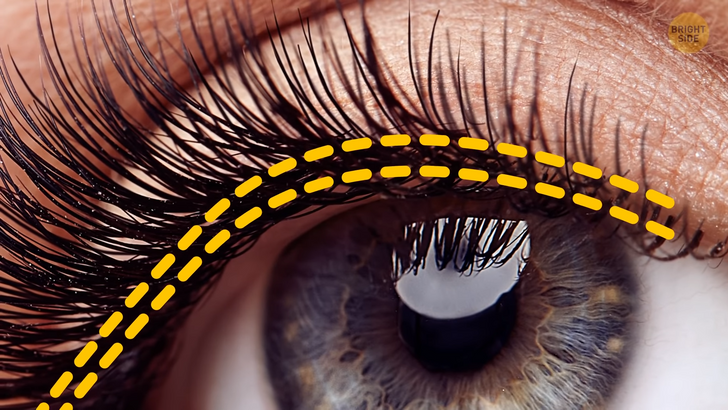
People with distichiasis are born with a second set of eyelashes that grow from the inner layer of the eyelid! While it may look pretty to some, these extra lashes can irritate the eye and cause problems like sensitivity to light, droopy eyelids, tearing, and inflammation! There are a few ways to treat the condition, like soft contacts, lasers, and cryotherapy. Dutch health guru Wim Hof claims that his breathing, meditation, and training have helped him gain all kinds of super-human abilities!
He’s trained his body to adapt to extreme temperatures and even learned how to raise his own body temperature. He’s also been able to adapt more quickly to altitude changes. He has even claimed that his training methods and strict diet and exercise regimen have improved his immune system!
We’re meant to get anywhere from 7 to 8 hours of sleep every night to function the next day. But there are some lucky people out there that only need 6 hours or less a night! This is caused by a genetic anomaly, and there don’t seem to be any adverse effects from having it.

We have about 10,000 taste buds. But some people have many more than that. Super Tasters! Thanks to their powerful ability to taste, sweet things like oranges, strawberries, and candy are almost too sweet. While bitter things like broccoli, cabbage, spinach, grapefruit, and coffee are overpowering! Well, thanks anyway, but I’ll keep what I have.
Most people have a total of 24 ribs. No not at the restaurant! In your body! There’s a chance that you might be 1 of the few that has 25 ribs instead! About 1 in 200 people have a cervical rib, a spare rib just above the first rib! It’s usually not even noticed because it’s above the collarbone and pretty thin. Hey, when’s lunch? I got hungry for some reason.
Chances are you have an innie belly button. That’s because only about 10% of the world’s population have an outie, making it pretty rare. It also has nothing to do with how our umbilical cord is cut! Our belly button stores a bit of fat beneath it, and it’s this that determines what kind of belly button you’ll end up with. So, don’t blame the doctor; the type you have is completely down to genetics.

If you’ve ever experienced high altitude, you should know how hard it is on your body. Even just walking up a hill can be a difficult task! Give it a few days, though, and things will become easier. Your lungs, blood cells, and body will adapt quicker than you think, letting you hold onto that precious oxygen for longer. This adaptation will last for as long as you stay up high, and you’ll go back to normal after a while back at a normal altitude.
When we submerge ourselves in water, it causes our heart rate to drop and oxygen consumption to slow! In recent years, free divers have pushed the limits of human lungs, by going down a record 700 feet! One person held his breath for more than 22 minutes underwater! We don’t know what the limits are yet, but people are testing the boundaries!
When a person has a photographic memory or total recall, this is called eidetic memory. It’s the ability to accurately recall sounds, images, or other things from your memory. Some can even be told a date in a calendar from years ago and tell you what day it actually was! Unfortunately, you can’t get an eidetic memory with practice; you have to be born with it.
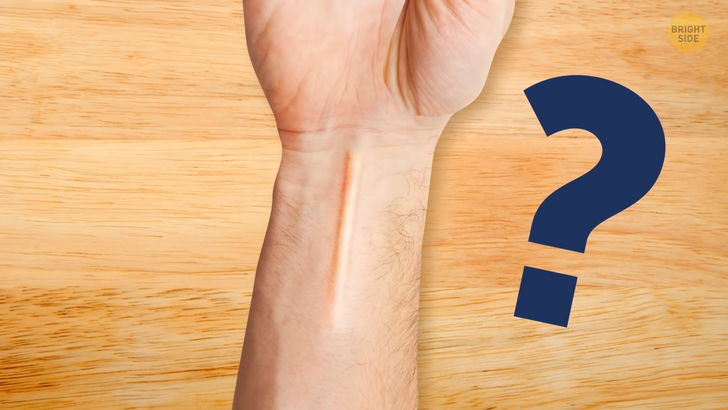
An ultramarathon runner named Dean Karnazes once ran for 350 consecutive miles and didn’t even sleep for 3 days! He is most famous for running 50 marathons in all 50 US States — in 50 consecutive days. He finished this achievement off by completing the New York Marathon in only 3 hours!
Some people have an incredible ability to find their way without using a compass or even the stars. This unique navigation ability has been linked to the strength of the signals given off in a certain part of the brain, called the entorhinal region.
Place the back of your wrist and forearm on a table, then squeeze your thumb and pinky together. Do you see a muscle raise up in the middle of your forearm? If you don’t, don’t worry. It’s vestigial. That means that it doesn’t do anything useful anymore. Hey wait, that’s me! It’s an old muscle that we used to use for climbing, and around 10 percent of the human population doesn’t even have it anymore!
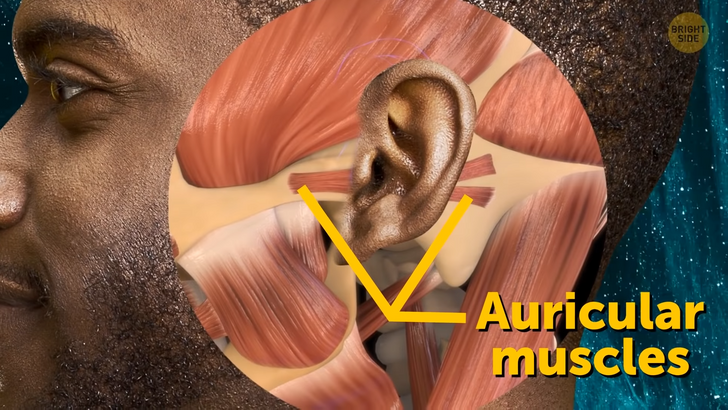
If you can wiggle your ears, you can thank your auricular muscles. Those are the ones on the outside of your ear. Even if you can’t wiggle your ears, the muscles are still there. Compared to other mammals, our ears can’t move much. Some mammals can even fully turn their ears to locate sounds. Just watch your dog or cat.
A dog’s third eyelid might be a little bit creepy the first time you see it, but we also have a third eyelid of sorts. But this human body part can’t move by itself and just covers a tiny part of the inside corner of your eye. It’s likely that it used to serve a purpose, but it’s pretty much useless now.
Sometimes, you just need a really good cry. It’s actually good for you too! Shedding tears when you cry helps release your stress hormones. It can also stimulate the production of endorphins, as well. Our body’s natural answer to aspirin!
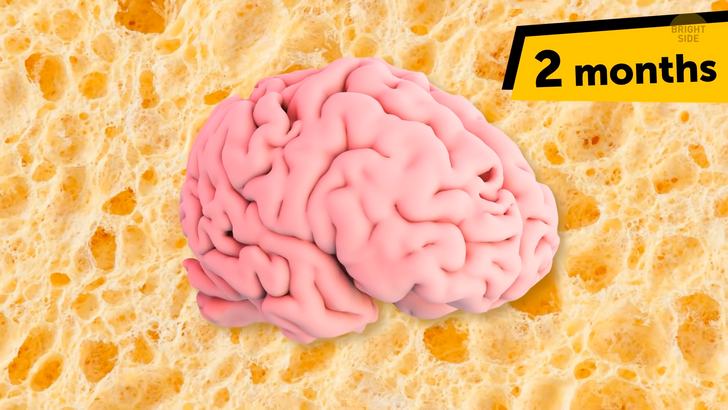
Your brain replaces itself every 2 months. Your liver, every 6 weeks. Your epidermis——or just skin——every month! Even your stomach lining replaces itself every few days. If your body didn’t do this, the acids inside of your stomach wouldn’t just digest food — they’d also start digesting you! So alright, what’s eating you? Oh, you...
The human lungs contain around 1,500 miles of airways and a total surface area of about 754 square feet when laid flat! But I would suggest that you don’t do that. Your lungs are on the clock 24/7, keeping you alive and breathing! Taking in 12 to 15 breaths a minute, or about 17,000 a day! Your left lung is slightly smaller than your right lung to make room for your big heart!
After years of wear and tear, your feet may weaken enough that they seem to grow! This can cause our arches to flatten, meaning broader and longer feet eventually! It won’t happen to everyone, but people who get swollen feet or ankles are more prone. If it does happen to you, you’ve got time. By age 70 or 80, your feet would’ve only gone up 1 size.
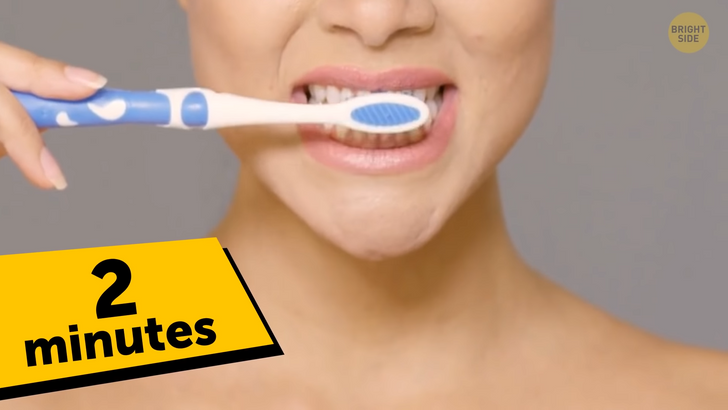
Taste is influenced a lot by the temperature of what you’re eating or drinking. For example, hot coffee seems less bitter and tastes much better because the heat tricks our bitter-detecting taste buds! The same goes for cold coffee too, the cold masks the bitter flavor and creates a more pleasant aftertaste. Room temperature coffee doesn’t smell the same or taste nice because the bitterness comes on more strongly.
Brushing your teeth too aggressively is very possible, and it’s not good for your teeth at all! It’ll wear down the enamel and make them sensitive to hot and cold foods. Teeth don’t repair themselves, so you’ve got to take care of them! Slow down you’re brushing and take a full 2 minutes to get your teeth properly cleaned! Um, don’t forget to floss too.











